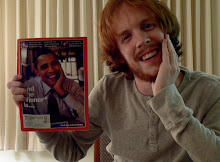
It may not be the American media this time, but, as always, you can count on the press to completely miss the point of a massive cultural phenomenon.
I'm referring to the coverage of Susan Boyle's recent performance on Britain's Got Talent. If you are unfamiliar with the show, it's essentially a variety/reality show competition, a la the [insert country here] Idol formula. The last big story to emerge from the show was the surprise success of Paul Potts, an unassuming cellphone salesman who happened to sing opera masterfully. His audition performance (and Ms. Boyle's, for that matter) is probably one of the greatest moments reality television has to offer, and he has since become an international superstar. The #1 album in 15 countries kind of superstar.
Ms. Boyle is a similar figure: she is forty-seven, unmarried, and spent all her life in the same village in Scotland; in other words, she doesn't possess any typical "showbiz" qualities. In fact, when she walks on stage, the audience (as well as the judges) are prepared to laugh her right back off of it. But then, within the first few bars of "I Dreamed a Dream" (one of my favorite B-Way ballads, by the way), a strange thing happened: the audience started clapping wildly and cheering her on with a standing ovation.
Throughout her performance, the show would cut to Simon Cowell's uncharacteristically bemused face, just to make its point even clearer: Cynical snarkiness has been the only thing keeping this beautiful voice silent, and the notion that this cynicism is synonymous with wisdom or taste is a false one.
Before she sang, Ms. Boyle told Simon that the only reason she hadn't sung professionally was that she "never had the chance." From what I can tell, if most people had their way, Susan would have never been given the opportunity. When she confessed that her dream was to be a singer like Elaine Page, the audience's reaction (both in theater, and, assumedly, at home) was one of derision, based solely on her appearance and manner.
Ms. Boyle is an ordinary person, no uglier or frumpier than most women her age, but since her television debut, writers have dubbed her, among other things, a "hairy angel...dowdy, with thick eyebrows."
This rubs me entirely the wrong way. How is it that the media can only celebrate a woman's inner beauty by pointing out her physical imperfections? I understand that these writers need to set the stage for the "surprising" nature of her performance, but come on people, cruel words are still cruel words.
Luckily for her, Ms. Boyle's life has prepared her for cruelty (I don't want to go too far into her backstory, but she suffers from a learning disability and has been teased about her appearance since she was a child); she can probably take all these articles on the chin without batting her eye. But that doesn't mean she should be given nothing but back-handed compliments from writers claiming to be so personally moved by her voice.
Let me put it more succinctly: If you are write an article about how Ms. Boyle proves the worthlessness of image-based expectations, try not to call her fat and ugly in your first sentence. That sort of defeats the purpose.
Nate
PS: This lady gets it. Good on her.

No comments:
Post a Comment